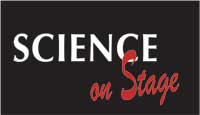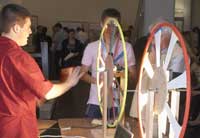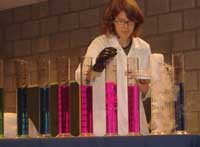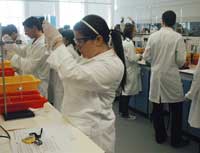Science on Stage: recent activities Inspire article
Many of the national Science on Stage organisations are becoming increasingly well established: running inspirational national events, inviting participants from across Europe to join them, and setting up projects with teachers in other countries. This commitment to European science education…

We would be delighted to hear about other national Science on Stage events and collaborations. Please send details to editor@scienceinschool.org
Science on Stage Austria

Image courtesy of Christian
Gottfried, Science on Stage Austria
On 28 April 2008, 25 scientists and teachers competed for the attention of their public: 50 science teachers and 370 school students at the Austrian Science on Stagew1 event in Vienna. The event aimed to interest students in scientific topics – so the students themselves helped to select the four winning contributions.
The competition was tough. Should the prizes be awarded for a play about quantum physics, a talk on the importance of stem-cell research, a school-built machine to measure the nicotine concentration in smokers’ blood, a school project to measure cosmic radiation, or something entirely different? Together, the jury and the audience selected their favourites: Ludwig Eidenberger’s ‘Latex motor’, Franz-Josef Natschläger’s ‘Ultrasound in fluids’, Gerhard Horacek’s ‘Mini wind tunnel’ and Josef Greiner’s ‘Particles and energy’. As a result, all four were invited to attend the German Science on Stage festival in Berlin on 23-26 October 2008w2.
Details of all the contributions are available on the Austrian Science on Stage websitew1.
Playful Science 2: Belgium

show at Science on Stage Belgium
Image courtesy of Xavier Van Kesteren
Multilingual workshops, inspiring presentations, a fair of teachers’ favourite experiments, a competition, explosions, prizes, music and a bagful of experiments to take home. No wonder the Belgian Science on Stagew3 event – Playful Science 2 – was filled to capacity on 16 January 2008.
Several of the short presentations linked not only different subjects, but also different senses. Johan Vanbeselaere presented his singing gravity detector, which he and his students used to hear gravity changes aboard an aeroplane, and Marc Debusschere introduced his project to link biology and physics by visualising birdsong.
At the end of the afternoon, each teacher received a bag of €10 worth of experiments and software, as well as tombola prizes of experimental equipment. Most importantly, though, they went home with new ideas, inspiration and contacts.
The next Belgian Science on Stage event will take place on 28 January 2009 in Jemeppes-sur-Sambre, Belgium. See the Belgian Science on Stage websitew3 for details.
A three-way collaboration: Ireland, the UK and Malta
The international Science on Stage 2 teaching festivalw4 in Grenoble, France (in April 2007) not only gave 500 science teachers from 28 countries the opportunity to swap inspiring teaching ideas, meet scientists and visit world-class scientific facilities (Capellas, 2007; Hayes, 2007), but also paved the way for international collaborations – for example, when Tim Harrison and Professor Dudley Shallcross from Bristol ChemLabSw5 at the University of Bristol, UK, met Maltese science teachers Chris Schembri, Simon Cassar and Doreen Mizzi.
The Maltese teachers were so impressed with Tim and Dudley’s lecture demonstration of atmospheric chemistry (‘A pollutant’s tale’) at Science on Stage that they invited them to Malta. In October 2007, the Bristol chemists repeated their performance – complete with liquid nitrogen, fresh eggs, fruit and exploding rubber gloves – and gave lectures on climate chemistry to 1100 14- to 18-year old students (half the country’s chemistry students of that age!) and 100 teachers from 19 of the 22 Maltese church secondary schools. Thirty science and geography teachers also attended an evening session on climate change.

international chemistry school in
Dublin in July 2008
Image courtesy of Tim Harrison
In July 2008, the visit was returned when 20 Maltese school students joined the well-established international chemistry summer school run by Trinity College Dublin, Ireland, and the University of Bristol, UK. A total of 61 students (aged 16-17) from the three countries carried out practical activities related to pharmaceutical research. They made aspirin, synthesised an anaesthetic, decaffeinated tea, analysed bleaches, and used electron microscopy as well as ultraviolet visible and infra-red spectroscopy.
University scientists gave talks on many topics, including toothpaste (Pathmanathan, 2007), perfume chemistry (Harrison & Shallcross, 2006), extremophile chemistry (Leigh, 2008) and the extraction of drug precursors from sea sponges.
The relationship between Bristol ChemLabS and Science on Stage Malta looks set to continue. Already, Tim and Dudley are planning to return for the first Maltese School Science Week in November 2009, to give lectures for Maltese state schools, for schools on the sister island of Gozo and for trainee teachers.
Tim Harrison and Dudley Shallcross would be happy to hear from other European organisations or groups who are planning summer schools and would like the Bristol scientists either to take part or to offer advice.
References
- Capellas M (2007) Science teaching flies high at Science on Stage 2. Science in School 5: 10-11.
- Harrison T, Shallcross D (2006) Perfume chemistry, sexual attraction and exploding balloons: university activities for school. Science in School 3: 48-51.
- Hayes E (2007) Awards, rewards – and onwards! Science in School 5: 12-14.
- Leigh V (2008) Salt of the Earth. Science in School 8: 60-62.
- Pathmanathan S (2007) You’re researching what? Toothpaste? Science in School 4: 64-66.
Web References
- w1 – For more details of all the activities presented at the Austrian Science on Stage 3 event, see: www.scienceonstage.at
- w2 – For more information about Science on Stage Deutschland eV and the 2008 festival, see: www.science-on-stage.de
- w3 – For information (in French, Dutch and English) about past and future Science on Stage Belgium events, see: www.scienceonstage.be
- w4 – For information about the five international Science on Stage festivals, links to national Science on Stage activities and many inspiring teaching ideas, see: www.science-on-stage.net
- w5 – Bristol ChemLabS is based at the School of Chemistry, University of Bristol, UK. See: www.chemlabs.bris.ac.uk
Resources
- For reports on the first Science on Stage international teaching festival at CERN in Geneva, Switzerland, see:
- Warmbein B (2006). Science teachers take centre stage. Science in School 1: 6-7.
- Warmbein B, Riggulsford M (2006) Space balloons, mousetraps and earthquakes: it’s Science on Stage! Science in School 1: 8-11.
- To learn about some of the Bristol ChemLabS activities for primary schools, see:
- Griffin A, Harrison T, Shallcross D (2007) Primary circuses of experiments. Science in School 7: 28-32.
- For Tim and Dudley’s suggestions on teaching climate change, see:
- Harrison T, Shallcross D (2008) Climate change modelling in the classroom. Science in School 9: 28-33.Harrison T,
- Shallcross D (2008) Practical demonstrations to augment climate change lessons. Science in School 10: 46-50.





